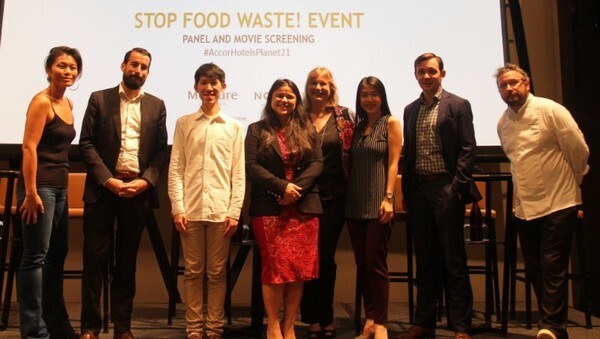AccorHotels galvanises Singaporean sustainability experts to reduce food waste by 30%

AccorHotels, the largest hotel operator in Singapore, is taking a leading role in cutting food waste in the country, with a commitment to reducing waste across its hotels by 30% to 2020. As part of this commitment, the group recently brought together experts from WWF Singapore, The Food Bank Singapore, Winnow Solutions, Treatsure and Native Bar, which specializes in zero-waste bartending, to share best practices with the hotel group's chefs, kitchen staff, bartenders and procurement leaders.
Singaporeans waste more than 140 kilos of food per person each year, and yet, according to a recent study, around 19% of Singaporeans are not food secure, meaning that they do not have physical or economic access to sufficient, safe and nutritious food. Singapore imports around 90% of all its food and wastes 30% of that, so the environmental impact is enormous because the food is being flown in and then thrown away.
"In a country as wealthy as Singapore, it's surprising to learn that so many Singaporeans go hungry every day while as a nation we are wasting so much food," said Gaynor Reid, Vice President Communications & CSR for AccorHotels Asia Pacific. "AccorHotels has always been committed to sustainable development and we have made a promise to reduce food waste across our global network by 30%. Here in Singapore, we realized that do to this we need to work with the whole food supply chain and find ways to not only reduce our own waste but also to redistribute left-over food that is perfectly safe for consumption to those in need."
Already the group works with providers such as Winnow Solutions to measure and record waste, which has seen some hotels reduce their waste by as much as 52%. But AccorHotels is also committed to educating its suppliers, partners and guests on the importance of reducing food waste.
"Often we see guests who pile their plates high at buffets and then don't finish," said Reid. "It would be better if people had numerous smaller plates and finished when they were full rather than us having to potentially send this wasted food to landfill."
AccorHotels is committed to using only sustainable seafood, to increasing local procurement where possible, and to growing its own herbs and vegetables through the planting of 1000 urban vegetable gardens globally. Working with WWF, the Food Bank and companies like Treatsure, which allows people to purchase surplus buffet food for takeaway, the group is also exploring further ways to redistribute excess food to those in need.
As part of its Planet 21 Acting Here CSR programme and its healthy and sustainable food charter, AccorHotels aims to recover or recycle 60% of its food waste. Currently, Singapore only recycles around 16% of food waste, with almost 800,000 tonnes of waste going to landfill last year. With food waste in Singapore increasing up to 50% over the last ten years, this is no longer sustainable and urgent action is required to find ways to reduce this.
Leaders from each organization led a panel discussion before a screening of the late Anthony Bourdain movie WASTED! The Story of Food Waste, which shocked many hotels teams into wanting to implement immediate changes. All 15 AccorHotels properties in Singapore must now implement a food waste programme by the end of November 2018.
ติดต่อเราได้ที่ facebook.com/newswit